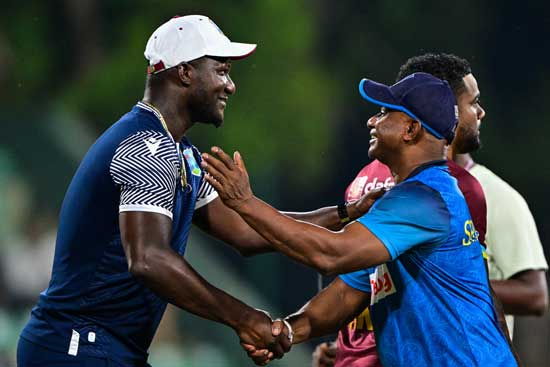Home advantage – a bane or a boon?
Sammy’s frustration is rooted in the drastic transformation of the pitch conditions during the series. He described the initial match as a “typical Dambulla wicket”, suitable for competitive play. However, he noted a troubling shift in the subsequent games, where the pitches became “rank turners”, heavily favouring Sri Lanka’s spinners. This shift, Sammy argues, severely limited the West Indies’ ability to execute their game plan, forcing them into a reactive stance.

Windies coach Darren Sammy was critical on the changing pitch conditions in Dambulla
“I thought we dominated in the first game,” he stated, reflecting on their initial performance.
“But you turn up and see a totally different wicket.”
His words emphasise not only the abrupt change but also the strategic implications it had for his squad, which was already missing key players. By altering the conditions so significantly, Sammy argues, Sri Lanka effectively leveraged an unfair advantage, undermining the series’ competitive integrity.
After restricting Sri Lanka to 179/7 in the first match, West Indies coasted to a 5-wicket win on the back of a strong top order batting. However, they lost the second game by 73 runs, after being bowled out for 89 runs, chasing 163 to win on a turning Dambulla pitch.
In the final T20, West Indies were restricted for 68 for 5 at the end of the 12th over, as batting looked extremely difficult against the spinners, but they scored 96 runs in the last eight overs to get them to score that many thought has given West Indies a competitive advantage. But Sri Lanka’s top order batting trio Pathum Nissanka, Kusal Mendis and Kusal Janith Perera powered the home team to an imposing win to clinch their maiden series win over West Indies.
The pitch which had some turn initially but got better for batting as the match progress. Home advantage is a customary aspect of international cricket but Sammy’s comments prompt a re-examination of its ethical boundaries, if there’s any.
“Home advantage is fine, but how much good does that make for the development of your sport?” he challenged. Sammy’s assertion suggests that while it is acceptable for teams to prepare conditions that suit their strengths, there must be a limit to such practices. The nature of the pitches can have long-lasting implications on the development of players, particularly in nurturing a balanced bowling attack that includes both spinners and fast bowlers.
“What good does that make for the development of your fast bowlers?” he asked, highlighting the potential stagnation in the skillset of Sri Lankan bowlers if they are primarily trained to bowl on spin-friendly surfaces.
In the final T20I, both Matheesha Pathirana and Nuwan Thushara bowled just two overs each, with the former being introduced as the seventh bowling option. Sammy was also candid about his team’s struggles against spin bowling, emphasising the need for improvement as they prepare for the upcoming World Cup.
“There’s much need for improvement with the way my guys play spin,” he acknowledged.
Despite the adverse conditions, West Indies managed to put up respectable scores, demonstrating potential resilience. However, this inconsistency must be addressed to achieve their goal of becoming a championship-winning team. “We have these wickets at home,” Sammy noted, pointing out that the West Indies have successfully navigated challenging conditions domestically.
This experience is crucial as they aim to build on their recent successes, moving from ninth to third in the T20 rankings over the past year. His emphasis on adaptability underscores the necessity for his players to refine their approach to playing spin, especially in the context of upcoming international competitions.
“Yes, when World Cup comes, we won’t get these conditions. ICC has to make sure the pitches are good,” he asserted, indicating his belief that fair conditions are essential for all teams to compete effectively.
Sri Lanka skipper Charith Asalanka did not agree with Sammy and as he said they were focusing on leveraging the team’s home advantage to secure victory in the T20 series.
“Sri Lanka’s strength has always been spin, and we firmly believe that our spin attack is crucial to our success,” Asalanka stated.
“We prepared pitches that support this strength. When our spin is effective, it significantly increases our chances of winning.” Asalanka’s perspective is well-founded. Apart from the three frontline spinners Maheesh Theekshana, Wanindu Hasaranga, and Dunith Wellalage, Sri Lanka also had two partners in Kamindu Mendis and the captain himself, thus leveraging the home advantage is well founded.
“We anticipated a spin-friendly wicket in the first match, but it didn’t turn out as we expected. In the second match, the spin increased, yet we still managed to score 162, and we chased down 163 in 18 overs in this game. Given these scores, it’s hard to argue that the wickets are bad,” he said.
Looking ahead to potentially better pitches, Asalanka is optimistic about their batting lineup’s ability to tackle any challenges.
“Our aim as a team is to score 200-250 on good tracks abroad, while being capable of posting 160-170 on tougher pitches,” he explained.


